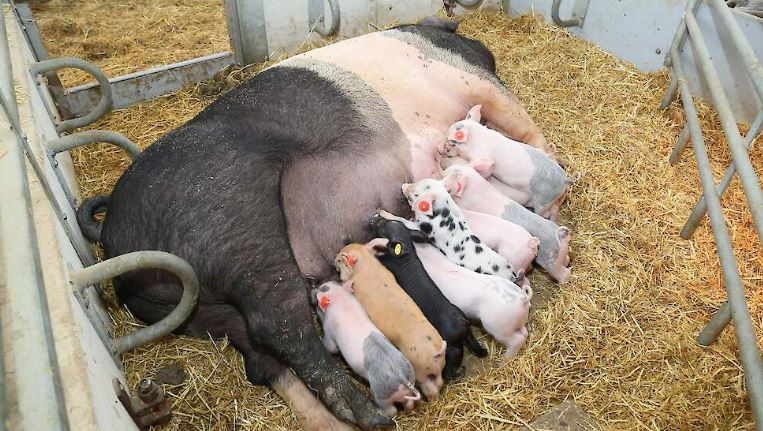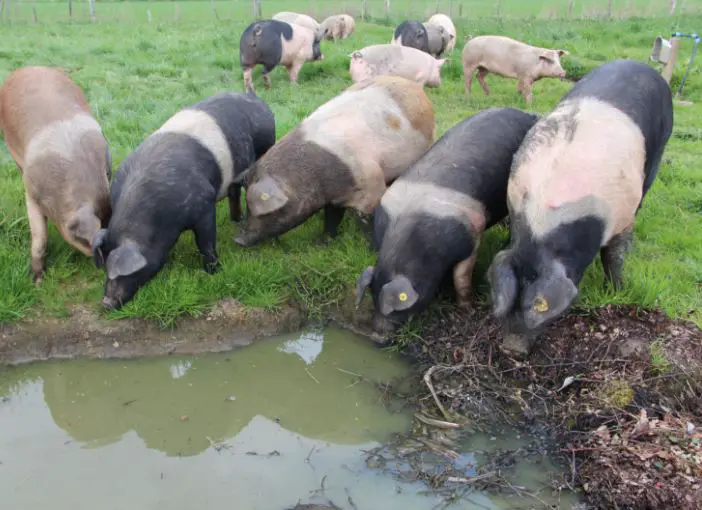Pigs have been domesticated for thousands of years, and different breeds have emerged to meet specific needs. One such breed is the pigs Hampshire breed. In this article, we will explore the Hampshire breed, its characteristics, breeding and management practices, its role in agriculture, health and care considerations, its market presence, and much more.
You may also want to read about LaMancha Goats.
Introduction: Pigs Hampshire Breed
The Hampshire breed of pigs is highly regarded for its desirable qualities, making it a popular choice among farmers and breeders. With its distinct physical appearance and amiable temperament, Hampshire pigs have earned their place in the swine industry.
History of the Pigs Hampshire Breed
The Hampshire breed traces its origins back to the United States, where it was developed during the 1800s. The breed’s development involved crossing English and Irish pigs with local American breeds. Through careful selection and breeding, the Hampshire pig emerged as a distinct breed known for its meat quality and productivity.
Characteristics the Pigs Hampshire Breed
Physical Appearance
Hampshire pigs are easily recognized by their black bodies and white belts that encircle their shoulders and front legs. They have a lean and muscular build, with a deep and wide body. The erect ears and dished face give them a distinctive appearance.
Temperament
Hampshire pigs are known for their docile and calm temperament. They are intelligent and easily trainable, making them suitable for various management systems. Their friendly nature also makes them easy to handle and work with, which is beneficial for both farmers and veterinarians.
Breeding and Management the Pigs Hampshire Breed
Selecting Breeding Stock
When it comes to breeding Hampshire pigs, selecting high-quality breeding stock is crucial. Breeders should look for pigs with desirable traits such as good conformation, growth potential, and excellent meat quality. Proper selection ensures the preservation and improvement of the breed’s characteristics over successive generations.
Housing and Feeding Considerations
Hampshire pigs thrive in clean and well-ventilated housing. Providing adequate space, proper flooring, and comfortable bedding is essential for their well-being. A balanced diet consisting of high-quality grains, protein-rich feeds, and essential nutrients is vital for their growth and overall health.
Hampshire Pigs in Agriculture
Economic Significance
Hampshire pigs play a significant role in the agricultural sector. They are primarily raised for meat production due to their excellent carcass quality and lean meat. The Hampshire breed contributes to the production of pork, bacon, and other pork-based products, meeting the ever-growing demand for high-quality pork in the market.

Common Uses
Aside from meat production, Hampshire pigs also serve as valuable breeding stock. Their desirable traits and market recognition make them sought after by farmers who aim to improve the productivity and quality of their herds.
Health and Care
Common Health Issues
Like any other pig breed, Hampshire pigs are susceptible to certain health issues. Some common health problems that can affect Hampshire pigs include respiratory infections, parasitic infestations, and digestive disorders. Regular veterinary care, proper hygiene, and a healthy diet can help prevent and manage these issues.
Vaccination and Preventive Measures
To ensure the well-being of Hampshire pigs, it is important to follow a vaccination schedule recommended by veterinarians. Vaccinations protect pigs from common diseases such as swine fever, erysipelas, and leptospirosis. Additionally, practicing good biosecurity measures, such as limiting contact with other pig populations and implementing proper sanitation protocols, can help prevent the spread of diseases.
Hampshire Pigs in the Market
Demand and Market Trends
The Hampshire breed has a strong presence in the market due to its exceptional meat quality and popularity among consumers. The demand for Hampshire pork remains consistently high, driven by its tenderness, marbling, and rich flavor. Moreover, the trend towards sustainable and locally sourced meat has further increased the demand for Hampshire pigs as they are often raised in small-scale, environmentally friendly systems.
Pricing and Profitability
The market price of Hampshire pigs varies depending on factors such as weight, age, and overall quality. Producers who raise Hampshire pigs for meat can benefit from their ability to command premium prices due to their superior meat characteristics. However, profitability also relies on efficient management practices, cost-effective feed sourcing, and effective marketing strategies.
Conclusion
In conclusion, Hampshire pigs have established themselves as a prominent breed within the swine industry. Their distinctive physical appearance, amiable temperament, and excellent meat quality make them highly desirable for farmers, breeders, and consumers alike. With proper breeding and management practices, Hampshire pigs can thrive, contributing to the agricultural sector and meeting the demand for high-quality pork.
FAQs
- What is the lifespan of Hampshire pigs? Hampshire pigs typically live for about 8 to 10 years, depending on their care and management.
- Are Hampshire pigs suitable for small-scale farming? Yes, Hampshire pigs are well-suited for small-scale farming as they adapt well to different management systems and are known for their docile temperament.
- How do Hampshire pigs compare to other pig breeds? Hampshire pigs are known for their superior meat quality, lean meat, and distinctive appearance, which sets them apart from other pig breeds.
- Can Hampshire pigs be raised for meat production? Yes, Hampshire pigs are primarily raised for meat production due to their excellent carcass quality, making them a popular choice for pork production.
- Are Hampshire pigs good mothers? Hampshire sows are known to be good mothers, displaying excellent maternal instincts and taking good care of their piglets.
